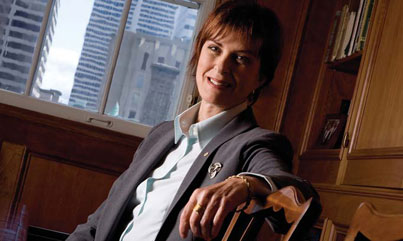From the Desk of the Principal
Only Connect

Christinne Muschi
As my close friends and colleagues will tell you, I love my job. And one of the high points is that I get to meet graduates of McGill and to hear your wonderful stories—that "Eureka" moment when you discovered your raison d'être, the lasting friendships you developed, the time you were sitting in biology class and saw the future love of your life.
Starting this spring, I will be traveling across North America and around the world, from Calgary to Boston to Beijing, to continue these conversations. As I look forward to my trips, I have been struck afresh by how uniquely international McGill is.
Our nearly 200,000 alumni live in almost every country in the world. Approximately 60 per cent of the 800 faculty we welcomed in the last eight years were recruited from outside Canada. We have the largest percentage of international students in Canada, and one of North America's highest, nearly 20 per cent. These students mingle with a large Quebec contingent (55 per cent) and pan-Canadian population (25 per cent). About 18 per cent have French as their first language.
The stats are impressive, but you need to step back to comprehend the full importance of McGill's diversity. To prepare for careers in a global knowledge society, students need to be culturally, linguistically and internationally fluent. Here at McGill, they can trade ideas in the classroom and the coffee shop with people who have lived and worked in many different cultures—in dynamic international centres of trade and in villages surviving desperate hardship. That face-to-face engagement shakes up preconceived notions and provides profoundly eye-opening perspectives and experiences.
The stories I hear from alumni and students reinforce my growing belief that great universities are vital players in our new world, not just because they produce highly skilled people, but because they are consummate matchmakers. I'm not talking about romantic relationships here, though those of you who met your soulmate at McGill know the importance of those, too.
Universities create global research collaborations, business partnerships and international talent networks. And in a world that is hyperconnected, as Robyn Meredith describes in her important new book, The Elephant and the Dragon, these connections have become the lifeblood of the new economy and the foundation upon which we will create peace, health and prosperity, and solve the most urgent problems. A local team of researchers, no matter how great, cannot conquer HIV/AIDS or make headway on climate change alone—it will take our global community.
Regions look to universities to provide the talent and reputation needed to boost local economies, so I am often called upon to defend McGill's large number of internationally dispersed alumni. Why should Quebec support a university that exports so many skilled people? Because in addition to the many professors and students we attract who make Quebec home, even those students that leave Quebec benefit the province; each graduate who moves away becomes a node in a global network that is more and more a fundamental part of how we conduct business, research and life.
E.M. Forster opens his wonderful 1910 novel, Howard's End, with an evocative epigraph: "Only connect…" Forster was talking about the need to reconcile the opposing forces he saw shaping his society—the seen and unseen, the intellectual life and the practical view, the inner life and the outer, the upper and lower classes. Nearly a century later, these words take on a new resonance. Our ability to reach out—whether across the street or around the world—affects our personal relationships, our professional success and the health and competitiveness of our society.
So I urge you to connect, with each other and with your alma mater. Get reacquainted with an old classmate at an alumni event. Share your favourite Montreal haunts with soon-to-be students at a Summer Send-Off. Explore a new business venture with a fellow grad. Mentor a student. And as for me, I can't wait to get out there and get to know you a little better.
(Please visit www.alumni.mcgill.ca/sites/campaign_mcgill for a schedule of the Principal's international tour.)


